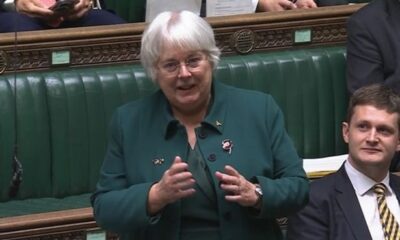Politics
UK Government Resumes Processing of Syrian Asylum Claims

The UK Government has announced the resumption of asylum claim processing for Syrian nationals, ending months of uncertainty for those whose applications had been paused. This decision follows the fall of the Assad regime in December 2023, which led to a temporary halt in processing as officials sought to understand the implications of the change in governance.
Home Office minister Dame Angela Eagle confirmed that the decision-making process can now continue, allowing many Syrians, who have faced prolonged waiting periods, to move forward with their claims. The announcement comes on the heels of a visit by Syrian refugees to Parliament, where they urged the Government to address the ongoing uncertainty surrounding their status.
Fareed Fakhoury, an asylum seeker, expressed his distress regarding the impact of this limbo on his family’s mental health. He stated, “This uncertainty has gnawed away at our mental health – my wife and four boys bear the scars of war and displacement.” Fakhoury highlighted the challenges his family faces, including difficulties in accessing legal support and concerns about his children’s education.
Another refugee, Afraa Hashem, who has survived both detention and the conflict in Aleppo, noted that despite being physically safe, “the instability in my home country weighs heavily on me.” Her comments underscore the emotional toll that prolonged uncertainty can impose on asylum seekers.
In her statement to Members of Parliament, Dame Angela Eagle explained that the pause in processing was necessary due to the lack of stable and objective information to assess the risks of returning to Syria. She emphasized that the Home Office has worked diligently to lift the pause as soon as sufficient information became available for accurate assessments.
The decision to resume processing has received support from various human rights organizations. Haytham Alhamwi, Chairman of the Syrian British Consortium, remarked, “Behind every delayed case is a person, often a family, living in limbo, unable to move forward with their lives.” He highlighted the contributions many Syrian refugees have made to British society, indicating their desire to build a future in the UK.
Following the fall of Bashar al-Assad, who ruled Syria with an iron fist, the UK Government paused asylum processing to gauge the evolving situation in the country. Home Secretary Yvette Cooper had stated that this pause was essential for ensuring the safety of those seeking asylum.
The Government’s update will include new information regarding country conditions, which will facilitate the processing of protection claims and reviews for safe returns.
Enver Solomon, Chief Executive of the Refugee Council, welcomed the Government’s decision but cautioned that the situation in Syria remains volatile. He urged that each asylum application be evaluated on an individual basis to ensure the safety and protection of those who could face severe risks if returned to their homeland.
As the UK Government proceeds with this renewed commitment to processing Syrian asylum claims, it faces the challenge of balancing humanitarian responsibilities with the complexities of international relations and domestic policy. The impact of this decision will be closely monitored by both advocates for refugees and those navigating the asylum system.
-

 World2 months ago
World2 months agoCoronation Street’s Shocking Murder Twist Reveals Family Secrets
-

 Entertainment2 months ago
Entertainment2 months agoAndrew Pierce Confirms Departure from ITV’s Good Morning Britain
-

 Health5 months ago
Health5 months agoKatie Price Faces New Health Concerns After Cancer Symptoms Resurface
-

 Health2 weeks ago
Health2 weeks agoSue Radford Reveals Weight Loss Journey, Shedding 12–13 kg
-

 Entertainment6 months ago
Entertainment6 months agoKate Garraway Sells £2 Million Home Amid Financial Struggles
-

 Entertainment5 months ago
Entertainment5 months agoAnn Ming Reflects on ITV’s ‘I Fought the Law’ Drama
-

 World3 months ago
World3 months agoBailey Announces Heartbreaking Split from Rebecca After Reunion
-

 Entertainment2 months ago
Entertainment2 months agoDavid Jason and Nicholas Lyndhurst Eye Reunion for Only Fools Anniversary
-

 Entertainment3 months ago
Entertainment3 months agoCoronation Street Fans React as Todd Faces Heartbreaking Choice
-

 World3 months ago
World3 months agoEastEnders’ Nicola Mitchell Faces Unexpected Pregnancy Crisis
-

 Entertainment2 months ago
Entertainment2 months agoBradley Walsh Sparks Strictly Come Dancing Hosting Speculation
-

 Entertainment2 months ago
Entertainment2 months agoTwo Stars Evicted from I’m A Celebrity Just Days Before Finale





















